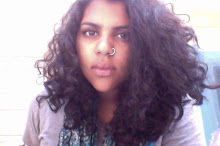“You know what, habibi?”
“Ha, sultana, tell me.”
“I love figs. Fresh figs. The ones you have with honey. Do you have it in Saudi? You must!”
“Feegs?”
“Yes Figs. I love them.”
He rested his hand on my shoulder, staring into me, searching for something. Anything. He could not see the gentle glide of jade peel encasing tender salmon flesh, sweet in the oriental sun. Searching and searching as if walking through desert sands on the way to Jeddah.
And then he found it. Like a fallen golden locket, almost lost, glittering in the sun in the midst of my hendi eyes.
“tiin.”
“tiin?”
“tiin,”
“Well then, I love you like I love tiin.”
Bassam, a smile. His eyes grow soft, I crumble into myself like flatbread.
Indian women always warned their daughters: nuvvu pichee paanlu chaestavu prema ki, telugu syllables steady under pressure. Daughters remind mothers: have you not done crazy things for love as well? Adolescent voices can crush rock. But sometimes my mother’s tongue still clicks in the back of my mouth. I pay no attention. So here I am. Oxford Arabic-English dictionary in hand, waiting for him on a bench outside the metro station. He’s late. Dawahar. My mother was right. We do crazy things when we are in love, but how can I help it? Anaa motayyama!

He and I met as I walked off the metro a week ago, brushing against him. Alma'derah he whispered. I turned around watching him watch me. He stepped off the metro and the doors closed. We faced each other. I smiled. He smiled back. But it was not a smile that was not familiar. It was a smile of my past, of the eastern world. It was a smile of villages that basked in heat and nomads who communicated through drums. Drums we so affectionately call hearts. We come from a tradition of figs: callous on the outside, but inside, you could imagine the sweetness perfected from shade. We the people of shade. We hide behind our language, the constant flirtations that occur transnationally. Ask an American businessman who wants to buy a sliver of Dubai. First, you must wait and sit on your knees under Bedouin tents. You must sip tea and warm the palette before discussion. And so the American is ready. Ready to talk business. He opens his mouth, ready to declare his price. “How is your family?” the sheik says, watching the sweating American businessman, pulling at his own collar, not sure what to say next. You see? We the people of the shade having nothing to hide behind but our words. That is Telugu. That is Arabic, That is life.
They say Arabs run on a type of time that others cannot understand. I blame Islam. He often says “I will meet you after prayers”: fajr, dhuhr, asr, maghrib, isha’a. But between prayers lies a two hour lapse period. You never know when his body is done bending over Persian carpets, fervently breathing Arabic underneath himself. Dawahar! I have been sitting on this bench for an hour and twenty seven minutes. And so I wait and wait, forming Arabic syllables behind my teeth like swallowing seeds.
alif, ba, ta.
alif, ba, ta.
alif, ba, ta
Arabic is the most dangerous language. It will cause you to melt, to fall in love, to turn to Jeddah and wait patiently on for a bus, looking through the alif, ba, and ta’s. Sounds evolve to words. I wait and wait; as body grows stiff, tongue unfolds:
A is for Allah because I pray for you.
B is for bakira because my hands like boats travel to you.
C is for cala because you guard my heart like a fortress
D is for daqiqa because, habibi, I would spend eternity with you if I could.
“Sorry for making you wait for too long, najla”
“What does that mean?”
“Wide eyes.”
“Is that a good thing?”
“Ah, yes. You are full of wonder and delight and full of optimism. You are one of najwa, romantic talk.”
I watch him watch me, uncertain what I am to say next. Wide Eyes. Oh Sapir –Whorf how you make me laugh! What man calls his woman wide eyed?
I grin and take his hand: “Youni enta. You are my eyes.”
And so we walk, two post-colonial vagabonds somehow in the midst of a nation that promoted English as a second language if it was not our first. It was certainly not his. Him, Saudi Sultan with his “kha’s” and “gah’s” thrown into his speech like pomegranate seeds in fresh curd. Oh, and tiin. Of course tiin. His voice sweeter than figs.


No comments:
Post a Comment